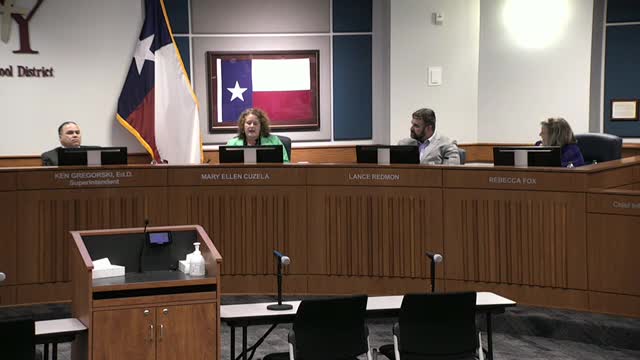School Board Sparks Controversy Over Delegate Selection Process
July 29, 2024 | KATY ISD, School Districts, Texas
This article was created by AI summarizing key points discussed. AI makes mistakes, so for full details and context, please refer to the video of the full meeting. Please report any errors so we can fix them. Report an error »

During a recent board meeting, discussions centered around the approval of delegates for the Texas Association of School Boards (TASB) and updates to board operating procedures, revealing underlying tensions among board members.
The meeting began with a motion to approve Dawn Champagne as the delegate and Lance Redmond as the alternate delegate to the 2024 TASB delegate assembly. While the motion received a second, it sparked a debate regarding the board's relationship with TASB, which some members criticized for having a monopoly over school board services. One member expressed a desire for alternatives to TASB, indicating dissatisfaction with its current influence.
As the discussion progressed, board members clashed over procedural changes, particularly a proposal to require three members instead of two to add items to the agenda. Critics argued that this change would stifle minority voices and limit the ability to bring important issues to the forefront. Proponents of the change defended it as a return to historical practices, asserting that it would ensure more thorough vetting of agenda items.
The debate highlighted differing perspectives on the role of TASB and the importance of inclusivity in board discussions. One member emphasized the value of networking and learning from diverse districts, while another contended that larger districts should not dominate the conversation.
Ultimately, the board voted on the motion to approve the delegates, which passed with a 7-0 vote. However, the proposed changes to the operating procedures faced significant opposition, with a motion to keep the requirement at two members failing to pass.
In addition to the delegate discussion, the board also endorsed Tony Hopkins for a TASB director position, reflecting a commitment to representation aligned with the board's values. The meeting concluded with updates from various committees, emphasizing the need for transparency and communication within the board's operations.
This meeting underscored ongoing challenges within the board regarding governance, representation, and the influence of external organizations like TASB, setting the stage for future discussions on these critical issues.
The meeting began with a motion to approve Dawn Champagne as the delegate and Lance Redmond as the alternate delegate to the 2024 TASB delegate assembly. While the motion received a second, it sparked a debate regarding the board's relationship with TASB, which some members criticized for having a monopoly over school board services. One member expressed a desire for alternatives to TASB, indicating dissatisfaction with its current influence.
As the discussion progressed, board members clashed over procedural changes, particularly a proposal to require three members instead of two to add items to the agenda. Critics argued that this change would stifle minority voices and limit the ability to bring important issues to the forefront. Proponents of the change defended it as a return to historical practices, asserting that it would ensure more thorough vetting of agenda items.
The debate highlighted differing perspectives on the role of TASB and the importance of inclusivity in board discussions. One member emphasized the value of networking and learning from diverse districts, while another contended that larger districts should not dominate the conversation.
Ultimately, the board voted on the motion to approve the delegates, which passed with a 7-0 vote. However, the proposed changes to the operating procedures faced significant opposition, with a motion to keep the requirement at two members failing to pass.
In addition to the delegate discussion, the board also endorsed Tony Hopkins for a TASB director position, reflecting a commitment to representation aligned with the board's values. The meeting concluded with updates from various committees, emphasizing the need for transparency and communication within the board's operations.
This meeting underscored ongoing challenges within the board regarding governance, representation, and the influence of external organizations like TASB, setting the stage for future discussions on these critical issues.
View the Full Meeting & All Its Details
This article offers just a summary. Unlock complete video, transcripts, and insights as a Founder Member.
✓
Watch full, unedited meeting videos
✓
Search every word spoken in unlimited transcripts
✓
AI summaries & real-time alerts (all government levels)
✓
Permanent access to expanding government content
30-day money-back guarantee

